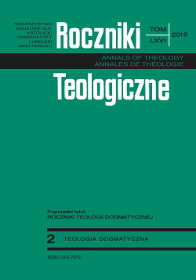Joseph Ratzinger's Answer on the Religious-historical Relativization of Christianity
Abstract
Joseph Ratzinger, who is author of the teaching document “Dominus Iesus”, published by Pope John Paul II at the turn of the millennium, opposes the relativisation of the Christian truth claim as it is made from the perspective of comparative religion. He distinguishes between an ascendant variation of religion (which is also called `Asian' or `related to mysticism') and a descendent variation of religion (which is also called `monotheistic' or `revelatory'). The former is determined by the relativisation of all dogmatic statements in favour of a transcendent truth, which each may interpret in their own way. The descendant variation, on the other hand, takes God, not man as a starting point. It is − whether in the form of Judaism, Christianity or Islam – monotheistic. For it is based on the personal self-revelation of the one and only Creator in the finitude of space and time. Whereas Judaism identifies the one and only truth of God with the history experienced and remembered by the people of Israel, Islam identifies the only truth of God with a book, the Qu'ran, as it is very much in contrast to Christianity where the person of Jesus Christ is considered the only truth of God. According to Joseph Ratzinger it makes a huge difference whether a person or a book is regarded to be the self-revelation of the absolute, i.e. God. This is because a person is not an object. The only logic that does justice to a person is the dia-logic, i.e. inter-communication or inter-action. A Christianity which remains faithful to its origin and to its true nature can never, as the emeritus Pope emphasizes by distancing himself from the Heidelberg Egyptologist Jan Asmann, commit any kind of violence against dissenters. Because the God whom Christians testify is none other than the man who said of himself, “He who has seen me has seen the Father.” (Joh 14.9) He is none other but the Redeemer, who allows Himself to be crucified rather than imposing something through violence, and may it objectively be the best which could be wished for.
References
Angenendt A., Toleranz und Gewalt. Das Christentum zwischen Bibel und Schwert, Verlag Aschendorff, Münster 2007.
Assmann J., Die Mosaische Unterscheidung oder Der Preis des Monotheismus, Verlag Carl Hanser, München 2003.
Assmann J., Exodus. Die Revolution der Alten Welt, Verlag Carl Hanser, München 2015.
Athanasius von Alexandrien, De incarnatione Verbi (Sources Chrétiennes 199), red. Charles Kannengießer, Éditions du Cerf, Paris 1973.
Bartnik Cz.S., A Personalistic Philosophy of History, „Homo Dei“ 11(1984), s. 193-199.
Die „Regensburger Vorlesung“ Papst Benedikts XVI. im Dialog der Wissenschaften, red. Christoph Dohmen, Verlag Friedrich Pustet, Regensburg 2007.
Egan H.D., „Der Fromme von morgen wird ein ,Mystiker` sein“. Mystik und die Theologie Karl Rahners, w: H. Vorgrimler (red.), Wagnis Theologie. Erfahrunggen mit der Theologie Karl Rahners, Verlag Herder, Freiburg 1979, 99-112.
Góźdź K., Jesus Christus als Sinn der Geschichte bei Wolfhart Pannenberg (Est NF XXV), Verlag Friedrich Pustet, Regensburg 1988.
Góźdź K., Logos-Christologie nach Joseph Ratzinger, w: E. Szczurko, T. Guz, H. Seidl (red.), Logos et Musica. In honorem Summi Romani Pontificis Benedicti XVI, Verlag Peter Lang, Frankfurt 2012, 153-162.
Habermas J., Vorpolitische Grundlagen des demokratischen Rechtsstaates?, w: F. Schuller (red.), Dialektik der Säkularisierung. Über Vernunft und Religion, Verlag Herder, Freiburg 2005, 15-37.
Hume D., The Natural History of Religion (1757), w: tenże, Principal Writings on Religion, Verlag Paul Russell, Oxford 1993, 134-193 [przekł. niemiecki L. Kreimendahl, Die Naturgeschichte der Religion, Verlag Felix Meiner, Hamburg 1984].
Jonas H., Die Macht des Heiligen. Eine Alternative zur Geschichte von der Entzauberung, Verlag Suhrkamp, Berlin 2017.
Lohfink G., Im Ringen um die Vernunft. Reden über Israel, die Kirche und die Europäische Aufklärung, Verlag Herder, Freiburg 2016.
Lucius Caecilianus Firmianus Lactantius, Epitome divinarum institutionum (BSGRT Teubner), red. Eberhard Heck, Atonie Wlosok, Verlag K.G. Saur, Stuttgart 1994.
Nordhofen E., Corpora. Die anarchische Kraft des Monotheismus, Verlag Herder, Freiburg 2018.
Rahner K., Frömmigkeit früher und heute, w: Schriften zur Theologie, t. VII, Verlag Benziger, Einsiedeln 1966, 11-31.
Ratzinger J., Der Heilige Geist als communio. Zum Verhältnis von Pneumatologie und Spiritualität bei Augustinus, w: C. Heitmann, H. Mühlen (red.), Erfahrung und Theologie des Heiligen Geistes, Verlag Kösel, München 1974, 223-238.
Ratzinger J., Unterwegs zu Jesus Christus, Verlag Sankt Ulrich, Augsburg 2003.
Ratzinger J., Glaube – Wahrheit – Toleranz. Das Christentum und die Weltreligionen, Verlag Herder, Freiburg 42005.
Ratzinger J., Was die Welt zusammenhält. Vorpolitische moralische Grundlagen eines freiheitlichen Staates, w: F. Schuller (red.), Dialektik der Säkularisierung. Über Vernunft und Religion, Verlag Herder, Freiburg 2005, 39-60.
Ratzinger J., Opera Omnia, t. VIII/1: Kościół – znak wśród narodów, przekł. W. Szymona OP, red. K. Góźdź, M. Górecka, Wydawnictwo KUL, Lublin 2013.
Ratzinger J., Opera Omnia, t. VIII/2: Kościół – znak wśród narodów, przekł. W. Szymona OP, red. K. Góźdź, M. Górecka, Wydawnictwo KUL, Lublin 2013.
Ratzinger J., Opera Omnia, t. I: Lud i dom Boży w nauce św. Augustyna o Kościele, przekł. W. Szymona OP, red. K. Góźdź, M. Górecka, Wydawnictwo KUL, Lublin 2014.
Ratzinger J., Opera Omnia, t. VI/1: Jezus z Nazaretu. Studia o chrystologii, przekł. M. Górecka. W. Szymona OP, red. K. Góźdź, M. Górecka, Wydawnictwo KUL, Lublin 2015.
Ratzinger J., Opera Omnia, t. IV: Wprowadzenie do chrześcijaństwa. Wyznanie – chrzest – nawrócenie, przekł. R. Biel, M. Górecka, red. K. Góźdź, M. Górecka, Wydawnictwo KUL, Lublin 2017.
Ratzinger J., Opera Omnia, t. IX/1: Wiara w Piśmie i w Tradycji. Teologiczna nauka o zasadach, przekł. J. Merecki SDS, red. K. Góźdź, M. Górecka, Wydawncitwo KUL, Lublin 2018.
Schwartz R.M., The Curse of Cain. The Violent Legcy of Monotheism, University of Chicago Press, Chicago 1997.
Copyright (c) 2019 Roczniki Teologiczne

This work is licensed under a Creative Commons Attribution-NonCommercial-NoDerivatives 4.0 International License.





